Texas Republicans accidentally gerrymandered themselves out of power in Dallas County
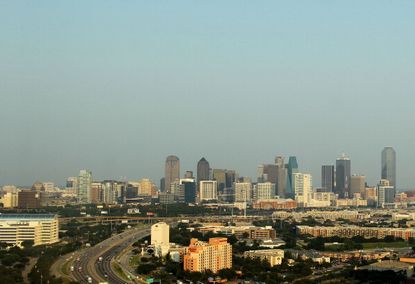

Gerrymandering — where one party draws legislative districts to stay in power and diminish the votes of the opposing party — doesn't appear to be very popular. In at least three states on Tuesday, voters approved ballot measures to take district drawing out of the hands of the state legislature and give it to nonpartisan or independent commissions — Michigan, Missouri, and Colorado passed their initiatives overwhelmingly, while an anti-gerrymandering measure in Utah is barely leading with votes left to count.
The reason for a party's temptation to gerrymander itself into power after every decade's census is probably pretty obvious, but it doesn't always work out as planned. Just ask Texas Republicans. While Democrat Beto O'Rourke and every other statewide Democrat lost in Texas on Tuesday, Democrats flipped two U.S. House seats, two state Senate seats, and an unexpectedly robust 12 state House seats. Five of those 12 state House seats were in Dallas County. That was a byproduct of aggressive gerrymandering, The Dallas Morning News reports.
After winning a supermajority in 2010, House Republicans gerrymandered Dallas County a little too thin to ensure they had a majority of the county's 14 House seats. But Republicans dropped from eight of those 14 seats to seven in the 2016 election, and on Tuesday they won two. Instead of opting for safer GOP districts in whiter parts of the county in 2011, "Republicans packed and cracked Latino voters across the county to diminish their voting strength overall and ensure a GOP majority," The Texas Tribune says.
Subscribe to The Week
Escape your echo chamber. Get the facts behind the news, plus analysis from multiple perspectives.

Sign up for The Week's Free Newsletters
From our morning news briefing to a weekly Good News Newsletter, get the best of The Week delivered directly to your inbox.
From our morning news briefing to a weekly Good News Newsletter, get the best of The Week delivered directly to your inbox.
"The lesson is you can get too clever in gerrymandering," redistricting expert Michael Li at NYU's Brennan Center for Justice tells the Tribune. Voting rights lawyer Jose Garza was more direct, saying Republicans "shaved those things off a little too close because they got greedy." You can read more about the perils of redistricting, and see the maps, at The Texas Tribune.
Create an account with the same email registered to your subscription to unlock access.
Sign up for Today's Best Articles in your inbox
A free daily email with the biggest news stories of the day – and the best features from TheWeek.com
Peter has worked as a news and culture writer and editor at The Week since the site's launch in 2008. He covers politics, world affairs, religion and cultural currents. His journalism career began as a copy editor at a financial newswire and has included editorial positions at The New York Times Magazine, Facts on File, and Oregon State University.
-
 Why au pairs might become a thing of the past
Why au pairs might become a thing of the pastUnder The Radar Brexit and wage ruling are threatening the 'mutually beneficial arrangement'
By Chas Newkey-Burden, The Week UK Published
-
 'A direct, protracted war with Israel is not something Iran is equipped to fight'
'A direct, protracted war with Israel is not something Iran is equipped to fight'Instant Opinion Opinion, comment and editorials of the day
By Harold Maass, The Week US Published
-
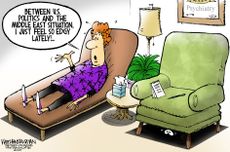 Today's political cartoons - April 17, 2024
Today's political cartoons - April 17, 2024Cartoons Wednesday's cartoons - political anxiety, jury sorting hat, and more
By The Week US Published
-
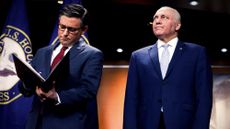 Why Johnson won't just pass Ukraine aid
Why Johnson won't just pass Ukraine aidSpeed Read The House Speaker could have sent $60 billion in military aid to Ukraine — but it would have split his caucus
By Peter Weber, The Week US Published
-
 Sudan on brink of collapse after a year of war
Sudan on brink of collapse after a year of warSpeed Read 18 million people face famine as the country continues its bloody downward spiral
By Peter Weber, The Week US Published
-
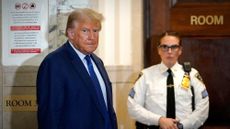 Trump's first criminal trial starts with jury picks
Trump's first criminal trial starts with jury picksSpeed Read The former president faces charges related to hush money payments made to adult film star Stormy Daniels
By Peter Weber, The Week US Published
-
 How will Israel respond to Iran's direct attack?
How will Israel respond to Iran's direct attack?Speed Read Iran’s weekend attack on Israel could escalate into a wider Middle East war
By Peter Weber, The Week US Published
-
 US, Israel brace for Iran retaliatory strikes
US, Israel brace for Iran retaliatory strikesSpeed Read An Iranian attack on Israel is believed to be imminent
By Peter Weber, The Week US Published
-
 Congress honors real-life Rosie the Riveters
Congress honors real-life Rosie the RivetersSpeed Read These American women reshaped the work force during World War II
By Peter Weber, The Week US Published
-
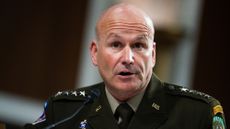 Outgunned Ukraine could fall, US general warns
Outgunned Ukraine could fall, US general warnsSpeed Read Without more US aid, Ukraine is at risk of losing the war
By Peter Weber, The Week US Published
-
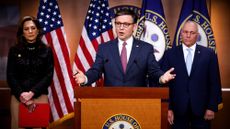 House GOP scuttles FISA vote at Trump's urging
House GOP scuttles FISA vote at Trump's urgingSpeed Read Right-wing lawmakers blocked Speaker Mike Johnson's surveillance bill
By Rafi Schwartz, The Week US Published